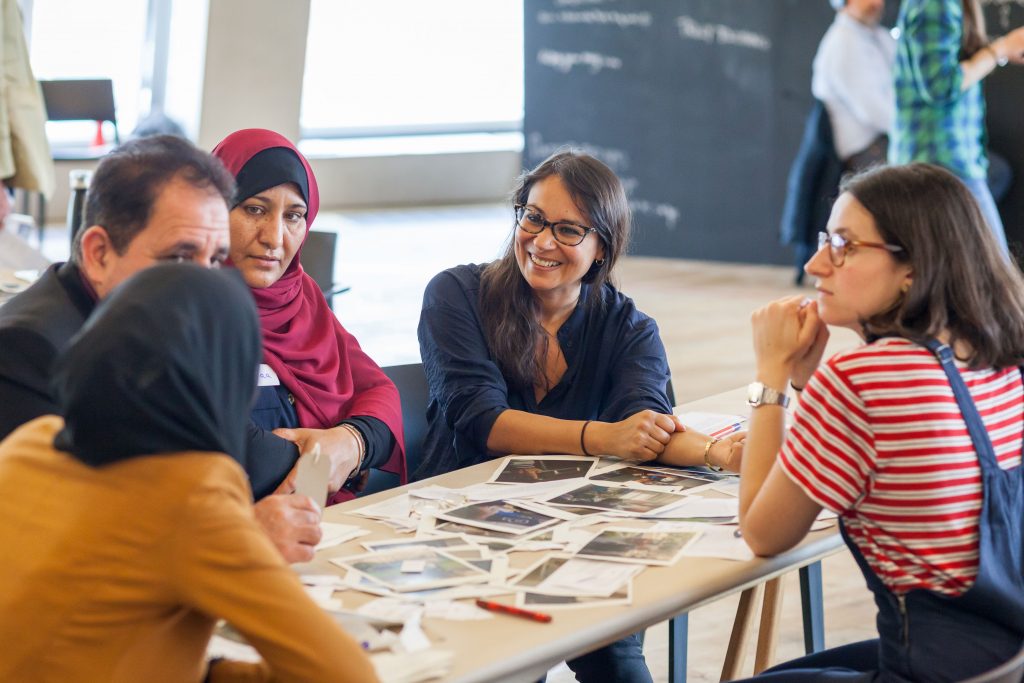Survival depends on safer spaces

Following a year in which racial trauma was brought to the fore, Amanda Huxtable reflects on the role of cultural leaders in creating safer spaces.
This article was first published in Arts Professional on 13 April.
2020 was a tough year for many. For some it was a year of reckoning; for others, it was a year of waking up to what many of us have lived through.
As Black and Asian cultural female leaders based in the north of England, the ‘Leeds 5’ – Kully Thiarai, Sharon Watson, Kathy Williams, Keranjeet Kaur Virdee and myself – we have a vantage point that unites us. There is so much to say and much, much more to do. You can hear our position clearly in our recent podcast, part of the Centre for Cultural Value’s Reflecting Value series.
I’m not going to use this space to explain our humanity or why structural and institutional racism, white supremacy and a dominant patriarchal society are not a roadmap out of our current situation. Let us take that as agreed. For those who cannot, please continue to educate yourselves. As my colleague Kathy Williams says: “There is no time for ignorance.”
Smoke and mirrors
One thing this unusual period has given us is a reminder of how precious time is. What does time have to do with being a Black and Asian female? Many of us are beyond frustrated at how long it has taken for the cultural industries to address racism. Institutions and leaders simply have not taken the responsibility to drive change seriously enough. We have lost many good and talented people in our industry over the years: peers who went on to teach, save libraries or fight the good fight in politics. Every single one of them has faced racism in some form. For us, there is nowhere to hide.
In his 2020 MacTaggart Lecture David Olusoga described himself, and those of us who have remained, as the survivors. What the Leeds 5 are inspired to do from here is build beyond a Covid-19 survival strategy, using the term ‘survival’ in hope of a healthier present and future. Decision makers in the cultural industries can no longer continue to write policies and plans without care or consideration for a broader base of people. This is what they pledged, and they will need to be held accountable in case it turns out to be smoke and mirrors once again.
We are delighted in the progress and attitudes from those pushing forward beyond survival. This kind of practice places self-care at the forefront without apology. It means working on collective responsibility and taking responsibility for those in their care seriously. They do what they can from where they are and continue to build from there. We can’t get enough of that!
Safer spaces
As a young girl in libraries and community-led spaces, I witnessed the creation of safer space. The need for safer spaces now more than ever sheds light on how little has changed despite all the good words, schemes and statements. We fight to create safer spaces alongside our colleagues and those who share our passion. For those who work in the cultural industries, these spaces are our rehearsal rooms, music, dance and theatre studios, and main houses in Leeds and the UK. These spaces belong to us all and our audiences. They should be a reflection of the world we wish to live in.
The intersectionality of our lives as Black and Asian women is with us every single day. There is a strength in unity, understanding and collective learning. We have a lived professional experience that influences our practice and decision making. We consider what it is to face racism in the UK with all the nuances that it deserves.
Let’s take education as an example of these nuances. Some of our children lack adequate housing and welcoming neighbours. They lack access to digital devices and the internet. Some are not able to afford access to higher education. The cost of transport and what it means to walk or ride safely on our streets causes major concern in our communities. We tend to run the cultural industry as if we have nothing to do with the world we actually live in. If we have learnt nothing else over this past year, it is what we decide to do now that will make a world of difference.
The Leeds 5 have created spaces where each member can express themselves with the support, trust and encouragement of each other. Spaces for creating art have always existed to encourage, celebrate, explore and give us the courage to question ourselves and the world we live in. Art enables activism in quiet as well as radical ways to resist and make change – but this can only happen in safer spaces amongst people who are empowered to contribute towards our collective future.
Amanda Huxtable is Director and Creative Producer at Vanitas Arts.
The Leeds 5 are:
- Keranjeet Kaur Virdee – Chief Executive of South Asian Arts-UK @Keranjeet
- Amanda Huxtable – Co-Director at Vanitas Arts @AmandaHuxtable
- Kully Thiarai – Creative Director and CEO of Leeds 2023 @kullyLeeds2023
- Dr Sharon Watson MBE, DL – CEO and Principal of the Northern School of Contemporary Dance @watson_dance
- Kathy Williams OLY – Co-Founder and Director of RJC Dance @RJCDance
Listen to the Leeds 5’s interview with Dr Emily Zobel Marshall on Episode Four of Reflecting Value: From where we stand
Image: Who are we? Counterpoint Arts and The Open University. Tate Exchange. Photo: Dan Weill Photography
Related news

Discover new visual ways to think about co-creation

This Is The Work: reflecting on new research findings about power in partnerships

Talking cultural policymaking with Pam Johnson, Leeds City Council

In Arts Professional: The Beauty Project

Watch online: Evaluation for Arts, Culture and Heritage Workshop





